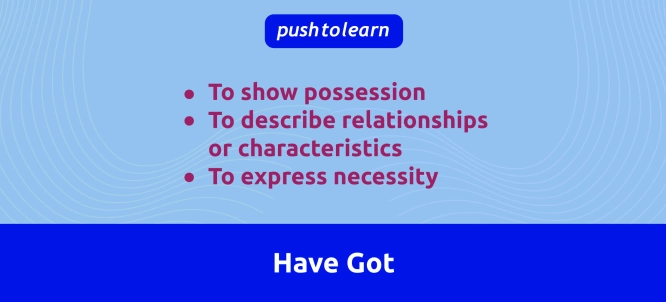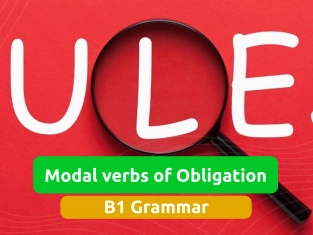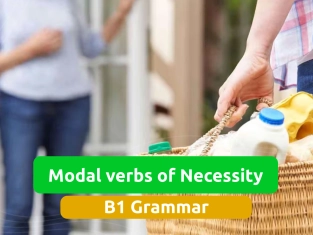by PushtoLearn
Have Got
Table of Contents
Have got - Exercises
These exercises focus on Have got
What Does “Have Got” Mean?
“Have got” is mainly used in British English to talk about:
-
Possession (something you own)
-
I have got a new phone. (= I own a new phone.)
-
Relationships (family, friends, etc.)
-
She has got two brothers. (= She has two brothers.)
-
Physical characteristics (appearance, features, etc.)
-
He has got blue eyes. (= He has blue eyes.)
-
Obligation or necessity (similar to “must” or “have to”)
-
I have got to finish my homework. (= I must finish my homework.)

How to Form “Have Got”
[Subject] + [have/has] + got + [object]
|
Subject |
Have/Has Got |
Example |
|
I |
have got |
I have got a new laptop. |
|
You |
have got |
You have got two pets. |
|
He/She/It |
has got |
She has got long hair. |
|
We |
have got |
We have got a big house. |
|
They |
have got |
They have got a problem. |
Note: In American English, people often use just "have" instead of "have got."
-
I have a car. (American English)
-
I have got a car. (British English)
Negative Form of “Have Got”
To make a negative sentence, add “not” after have/has.
|
Subject |
Negative Form |
Example |
|
I |
haven’t got |
I haven’t got any money. |
|
You |
haven’t got |
You haven’t got time. |
|
He/She/It |
hasn’t got |
He hasn’t got a bike. |
|
We |
haven’t got |
We haven’t got a TV. |
|
They |
haven’t got |
They haven’t got children. |
Question Form of “Have Got”
To ask a question, switch the order of “have/has” and the subject.
|
Question Form |
Example |
|
Have I got…? |
Have I got everything I need? |
|
Have you got…? |
Have you got a pen? |
|
Has he/she/it got…? |
Has she got long hair? |
|
Have we got…? |
Have we got enough food? |
|
Have they got…? |
Have they got a car? |
Short Answers:
-
Yes, I have. / No, I haven’t.
-
Yes, she has. / No, she hasn’t.
“Have Got” vs. “Have”
Both “have got” and “have” mean the same thing, but their use depends on the variety of English.
|
British English (More Common) |
American English (More Common) |
|
I have got a dog. |
I have a dog. |
|
She has got a new car. |
She has a new car. |
|
Have you got a phone? |
Do you have a phone? |
|
He hasn’t got any money. |
He doesn’t have any money. |
Common Mistakes
1. Using “got” without “have”
❌ I got a car. (Incorrect for possession)
✅ I have got a car.
(Note: “I got a car” can mean “I bought a car” in the past.)
2. Forgetting “got” in British English
❌ I have a brother. (Correct in American English, but British speakers often say...)
✅ I have got a brother.
3. Using “do” with “have got” in questions
❌ Do you have got a pet?
✅ Have you got a pet?
“Have Got” in Everyday Conversations
-
At school: Have you got a pencil?
-
At the doctor’s office: I have got a headache.
-
Talking about family: She has got two sisters.
-
Making plans: I haven’t got time today.
FAQs about “Have Got”
Is “have got” the same as “have”?
Yes, in most cases. “I have got a car” = “I have a car.”
Can I use “have got” in American English?
Yes, but Americans usually prefer “have” (I have a new phone instead of I have got a new phone).
Can I use “got” in the past?
No. “Have got” only works in the present. Use “had” for past possession (I had a dog when I was a child).
What’s the difference between “have got” and “have to”?
-
I have got a new car. (Possession)
-
I have got to go now. (Obligation = I must go.)
Is “I’ve got” correct?
Yes! It’s the contracted form of "I have got."
-
I’ve got a new job!
-
She’s got a cute cat!

